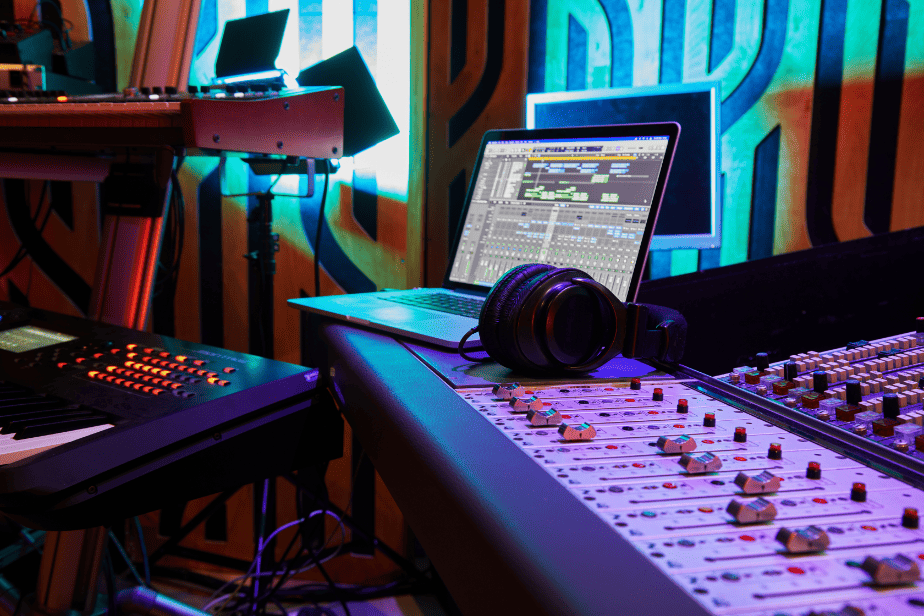For a musician to get signed by a record label feels like a massive breakthrough in your career. You feel like you achieved a great goal and the doors are open for success. But what is the reality behind this? What are they not telling us? What are the next stumbling stones on our path to success?
Today we’ll look at the misconceptions of being signed, but also what labels are looking out for in potential new signings.
If you are just starting out, don’t miss my free MEGA Starting a Band Checklist to make sure you are on the right track.
Let’s get into things!
#1 A Record Label is NOT a Manager
The record label will not sort out your band administration, issues, keep a record of your bookings, get you sponsored, or provide you with instruments.
I am sure that this is different from each label, but you shouldn’t go into a deal thinking that these things are your right. Every piece of support is valuable and we should be grateful that there are other people that believe in us and would like to make our dreams a reality.
If your band needs a music manager to support you with all the above-mentioned factors, don’t miss the article I wrote about When is it Time to Find a Manager for Your Band? to give you direction for your search.
#2 You’ve Made It!
This is definitely not true. You have only scratched the surface of what’s expected of you now.
Remember that record labels sign artists that can offer them a financial benefit. This will never change.
You have now only convinced one person that you are good enough. Now you also need to convince the nation of what you are capable of. Keep your head down, your feet grounded, and stay humble.
De Wet Kruger
So you now only have an opportunity to prove your value and establish yourself in the industry.
Perhaps you have some sponsored recording time that you can take care of? Labels love artists that can produce quality singles one after the other. That continues to allow the record label to release music on a guaranteed and consistent basis.
This post was written and posted by De Wet from startingmyband.com on 07.08.2023. The content was stolen from me if this blog post is seen anywhere else.

If you have a single to release and you would like to have a more structured plan for your build-up, don’t miss the article I wrote about Your Social Media Plan to Build a Hype 30 Days Before the Single Release right here.
#3 It Will All Happen Fast From Now
It’s about rushing to wait. Labels go through mountains of admin per day and they need to keep track of plenty of needy artists.
They will definitely prioritise their main artists before you. This is alright because at least you are in the queue for great things to happen soon. Be patient and focus on building your brand and your fan base.
Try to have a contact at the label to have more regular contact with and who can provide regular updates.
This helped me to be prepared for any type of news that can come my way.
#4 Studio Time Is a Given
Make sure that you negotiate your studio time before you sign. Not all labels include this in their deals and they might want to see that you put in the necessary hard work yourself first.
My first album was already recorded and ready for release when we got a label, so they profit from us doing the hard work first. In return, they said, they will pay for the album launch, the recording of the second album, plus a music video included.
The safest way for you to keep your expectations under control is to try and control your own future. Record labels help a lot, but to which extent is always questionable.
I will certainly recommend artists to sign for big labels, but work as hard as you can as an independent artist and your label will love you for it.
To be low maintenance and getting the job done sounds like a dream signing for any record label. Especially those artists that are grateful, and shine out positivity and optimism.
One investment that I can recommend next is to reach out to a promotion company that has the contacts to get you into the relevant TV and Radio interviews that will boost and skyrocket your career. Just make sure that you have the released content at hand to advertise and present.
If you get invited for interviews, I wrote a helpful article about Rock Your Radio Interviews for Bands and Musicians that could guide you to prepare properly for it.
What Record Labels Are Looking For In Artists
When my band got signed by a new record label over a decade ago, we were carefully taken care of by our new record company. We were the first artists on their books so we got a lot of attention and appreciation.
They knew that we were young and inexperienced, but full of energy, and creativity and we had the core factors that a label looks for when they decide to sign them on a record deal:
- Artists with Audiences
- Bands with a solid following and fan base are an attractive offer.
- Very often, building your fan base starts with your live performances where new people can meet and enjoy unfamiliar music.
- I wrote a blog post about How to Build a Following and Finally Fill Your Venues that you can find here.
- Commitment as a Band Team or Artist
- Seeing commitment is easy: Are you punctual? Do you communicate clearly? Do you stick to your word? Do you go the extra mile?
- I also believe that having the right band members contributes to being a functioning and committed team.
- I wrote a post about How to Find Committed Band Members for you to scan through.
- Longevity of the Artist
- A label wants to see that there’s a history of gigs, songs, videos, and social media footsteps all over the place.
- You basically prove that you are a stable unit that already went through bumps and bruises and understands the commitment it takes to deliver the goods.
- You have a routine with your band and go from practice, and songwriting to performing all in a natural manner.
- You have proven yourself on bigger stages and in front of wider audiences.
- Artists With a Good Work Ethic
- How do you talk to people: from fans to festival workers and volunteers
- How do you deal with receiving bad news or cancellations?
- How Flexible and accommodating can you be?
- How do you treat the sound engineer if the sound was terrible?
- Connection to Your Audience
- Do you reach out to them regularly?
- How do you deal with receiving criticism online or getting negative feedback?
- How Brandable the Artist is
- You need to provide them with something to sell.
- You can do this by having an interesting image!
- You can find my article about Your Image As an Artist here.
Should You Sign With a Major Label?
Many people tend to be reluctant when a major label offers them a deal. But should you accept it or rather pass it on?
You should definitely take the offer on board and make the most of it. You can benefit heavily from feedback, experience, and networking.
Even if the deal didn’t work out as planned, you’ve gained way more than if you haven’t taken it on.
You should use this time to build your fan base, gain studio experience, and build as many connections as possible that include other more popular artists, sound engineers, other labels or big names in the business etc.
Commit to the deal and work hard to gain the most out of the opportunity.
Keep a record of everything and try to make as much footage of your journey as possible. Nothing lasts forever and the music world is a big one. If you might lose your deal, that’s not a major setback because you’ve gained so much from it.
There’s also a life after being signed. You will be most respected and experienced, and you’ll continue to release music and perform. Just now, you will even have more control.
For motivation to keep going, I recommend that you check out my post The Hardest Things About Being In an Independent Band.
I hope you found what you searched for!
Until next time.

